Definition of an Analog Multimeter
An analog multimeter is a versatile instrument used to measure electrical quantities such as voltage, current, and resistance. Unlike its digital counterpart, an analog multimeter displays these measurements on a scale using a moving needle, providing a visual representation of the quantity being measured. This device is an essential tool for electricians, engineers, and anyone involved in electrical work.
The analog multimeter, also known as a VOM (Volt-Ohm-Milliammeter), has been around for many years and continues to be a reliable tool in the electrical and electronics field. Despite the advent of digital multimeters, the analog version remains popular due to its unique advantages, which we will explore later in this article.
Understanding the workings of an analog multimeter is crucial for anyone involved in electrical work. It not only aids in accurate measurements but also ensures safety while handling electrical components. Let’s delve into the basics of an analog multimeter.
Our Top Analog Multimeter Picks
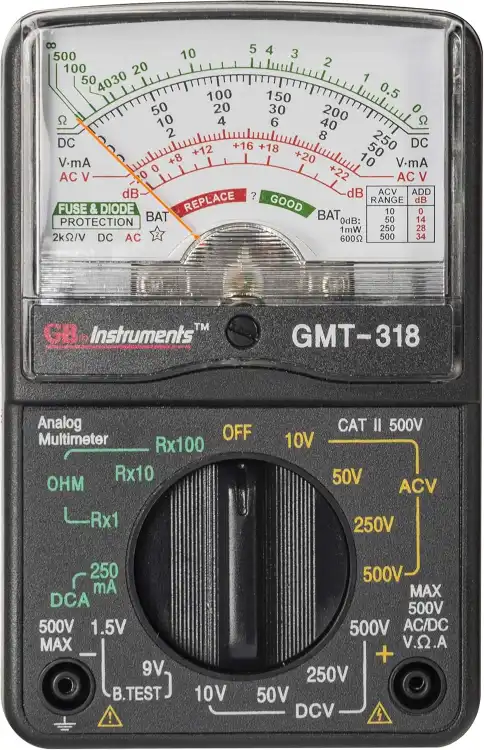
Gardner Bender GMT-318 Analog Multimeter
Check on AmazonKey Specifications:
- Functions: 6 Function, 14 Range
- Voltage Range: Up to 500V
- Display: Color-coded analog
- Power: Requires 2 AA batteries
- Dimensions: 1.25 x 2.75 x 4.25 inches
The Gardner Bender GMT-318 Analog Multimeter is a highly reliable tool for any professional or DIY enthusiast. With its manual range selection, it offers precision across 14 different ranges for both AC/DC voltage measurements. The color-coded analog display ensures quick and easy readings, while the fuse overload protection circuitry adds an extra layer of safety. The 15-position rotary dial allows for versatile measurements, and the inclusion of replaceable test leads makes it a durable and convenient choice for various applications.
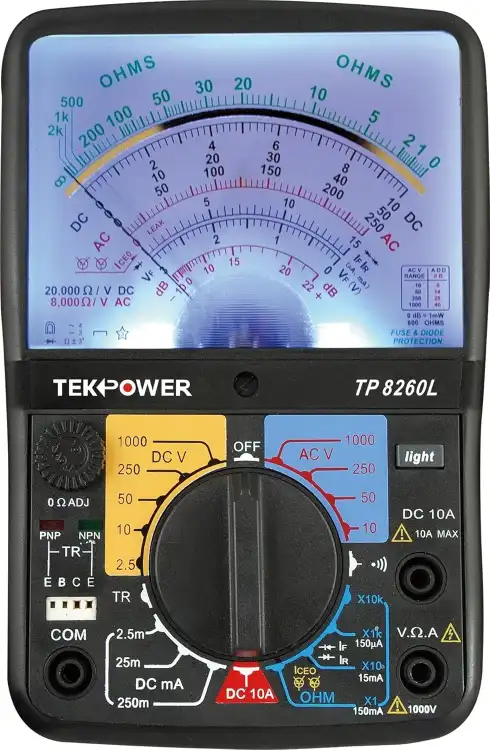
Tekpower TP8260L Analog Multimeter
Check on AmazonKey Specifications:
- Power Source: 2 x AA batteries
- Voltage Range: DCV: 0-1000V, ACV: 0-1000V
- Current Range: DCA: 2.5 mA – 10A
- Resistance Measurement: 1-20M Ohm
- Additional Features: Decibel measurement, diode test, transistor checker
The Tekpower TP8260L Analog Multimeter is a versatile tool packed with features. Its backlight makes it perfect for use in low-light environments, and the transistor checking dock supports both PNP and NPN types, making it a valuable asset for electronics testing. The high accuracy across multiple ranges, especially in DC voltage and current, is impressive. With the added functionality of measuring decibel values and diodes, this meter is highly efficient for both professionals and hobbyists. Its rugged protective case ensures durability.
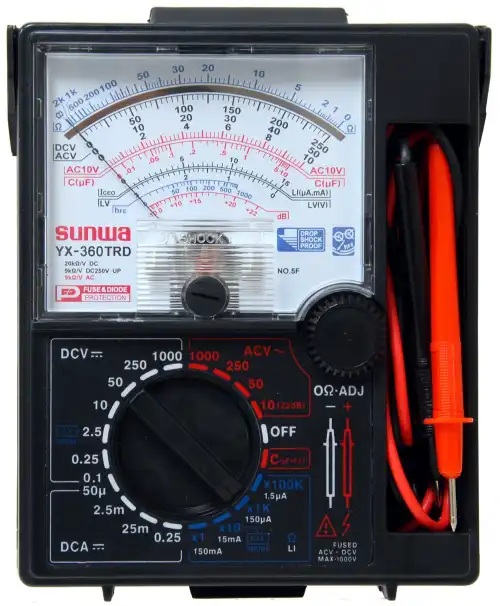
Sunwa YX360-TRD 7-Function 16-Range Analog Multimeter
Check on AmazonKey Specifications:
- Voltage Range: DCV: 0-1000V, ACV: 0-1000V
- Current Range: DCA: 50µA to 250mA
- Resistance Measurement: 0-200M Ohm
- Capacitance Range: 0-10µF
- Additional Features: Diode check, dB measurement, fused ranges
The Sunwa YX360-TRD analog multimeter is an impressive tool for precise measurements. Its mirrored scale provides a clear and easy-to-read display, while the one-touch capacitance estimation is an excellent feature for quick, efficient testing. This meter shines in its DC current measurement, able to capture values as low as 10 microamps, something digital meters typically struggle with. It also includes a diode check and transistor leak current function, making it versatile for various applications. The fused range protection ensures safe usage.
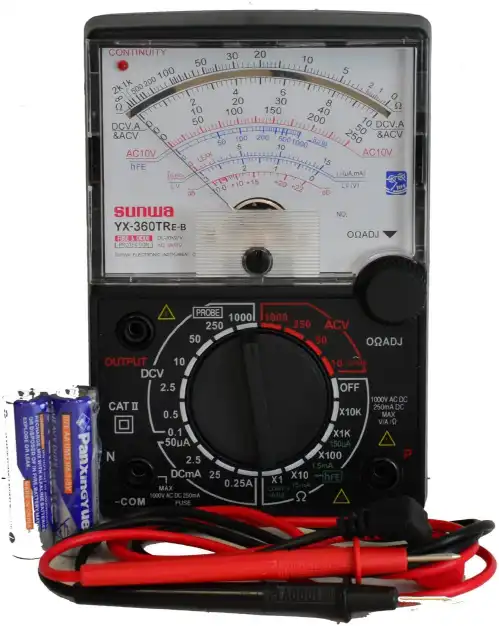
Tekpower 8-Function 19-Range Analog Multimeter
Check on AmazonKey Specifications:
- Functions: AC/DCV, DCA, Resistance, Diode Check, Continuity, dB, Transistor Leak Current
- DC Sensitivity: 20kOhm/V
- Display: Mirrored scale for clarity
- Weight: 7 ounces
- Dimensions: 6.75 x 1 x 4.75 inches
The Tekpower YX360-TRE-B is a versatile analog multimeter that offers a wide range of functions, including AC/DC voltage, DC current, resistance, and diode check. It features a mirrored scale, which makes readings easier and more accurate. The 20kOhm/V DC sensitivity is ideal for precise low voltage measurements. With a continuity test, dB measurement, and transistor leak current feature, this meter is perfect for both basic and advanced electrical testing. Its compact size and simple operation make it a reliable tool.
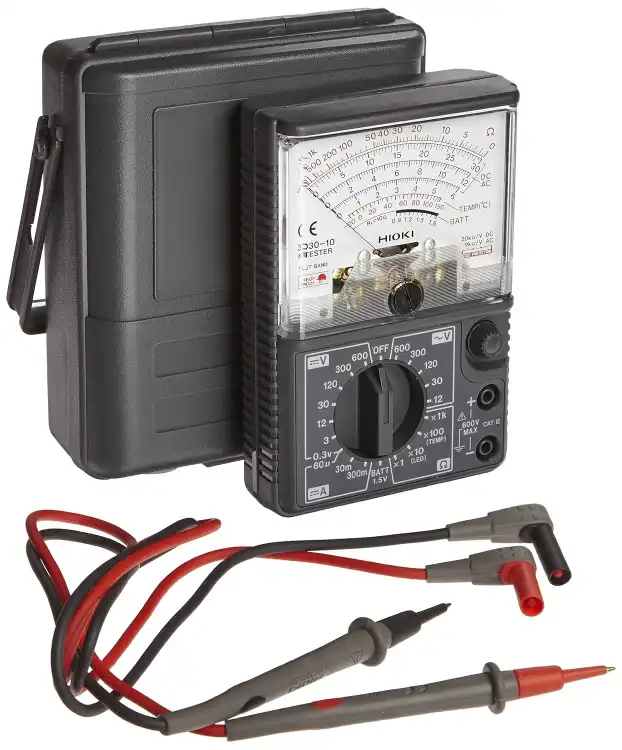
Hioki 3030-10 HiTester Manual-Ranging, Average-Sensing Analog Multimeter
Check on AmazonKey Specifications:
- Functions: Voltage, resistance, current, battery testing
- Average-Sensing: Accurate for linear loads with undistorted waveforms
- Safety: Certified for Category III installations up to 600V
- Temperature Measurement: With thermistor probe (sold separately)
- Durability: Survives drops from up to 1 meter
The Hioki 3030-10 HiTester is a reliable manual-ranging analog multimeter ideal for electrical testing in residential or industrial environments. Its average-sensing feature ensures accurate readings on linear loads, such as motors and incandescent lights. This meter offers voltage, resistance, and current measurement, with the added benefit of a battery tester for 1.5V cells. It meets IEC safety standards for Category III installations up to 600V and is robust enough to withstand drops up to 1 meter. A thermistor probe can also be connected for temperature measurements.
Importance of Reliable Electrical Testing
Reliable electrical testing is paramount in ensuring the safety and efficiency of electrical systems and devices. It helps in identifying potential issues, preventing electrical failures, and ensuring that electrical installations are operating optimally. An analog multimeter plays a crucial role in this process, providing accurate and reliable measurements.
Without reliable electrical testing, we run the risk of electrical failures, which can lead to equipment damage, productivity loss, and even safety hazards. Therefore, having a reliable tool like an analog multimeter is essential for anyone involved in electrical work.
Moreover, reliable electrical testing using an analog multimeter can also help in troubleshooting and repairing electrical devices. By accurately measuring electrical quantities, one can identify the root cause of an issue and take the necessary corrective action.
Understanding the Basics of an Analog Multimeter
How an Analog Multimeter Works
An analog multimeter works on the principle of electromagnetic deflection. When a current passes through the coil in the presence of a magnetic field, it causes a deflection of the needle on the scale. The degree of deflection is proportional to the current passing through the coil, which is then used to measure the electrical quantity.
The analog multimeter has a selector switch that allows the user to choose the type of measurement (voltage, current, or resistance) and the range of measurement. Once the appropriate selection is made, the probes of the multimeter are connected to the circuit or device under test, and the reading is taken from the scale.
One of the key aspects of using an analog multimeter is understanding how to read the scale. The scale is usually divided into different sections for different types of measurements, and the user must know which section to read based on the selector switch position.
Key Components of an Analog Multimeter
The key components of an analog multimeter include the moving coil meter, the selector switch, the probes, and the scale. The moving coil meter is the heart of the multimeter, responsible for the deflection of the needle. The selector switch allows the user to choose the type and range of measurement.
The probes are used to connect the multimeter to the circuit or device under test. They come in two types: the red probe for positive or live connections and the black probe for negative or ground connections. The scale is where the measurement is displayed, and it is divided into different sections for different types of measurements.
Understanding these components and how they work together is crucial for effectively using an analog multimeter. It not only helps in taking accurate measurements but also ensures safe handling of the device.
Advantages of Using an Analog Multimeter
Precision and Accuracy
One of the main advantages of using an analog multimeter is its precision and accuracy. Unlike digital multimeters, which round off the readings to the nearest whole number, analog multimeters provide a continuous scale, allowing for more precise readings. This is particularly useful when measuring quantities that vary continuously, such as the output of a variable power supply.
Moreover, analog multimeters are known for their accuracy. As long as the meter is properly calibrated, it can provide very accurate measurements. This is crucial in electrical work, where even a small error in measurement can lead to significant issues.
However, it’s important to note that the precision and accuracy of an analog multimeter depend on the user’s ability to read the scale correctly. Therefore, proper training and practice are required to effectively use this device.
Versatility in Electrical Testing
Analog multimeters are highly versatile tools that can measure a wide range of electrical quantities. They can measure voltage, current, and resistance, making them suitable for a variety of electrical testing tasks. Whether you’re testing a simple circuit or troubleshooting a complex electrical system, an analog multimeter can be a handy tool.
Moreover, analog multimeters can measure both AC and DC quantities, further adding to their versatility. They can also measure other quantities such as capacitance and inductance with the help of additional circuits.
It’s worth noting that the versatility of an analog multimeter depends on its features and specifications. Therefore, when buying a multimeter, it’s important to choose one that meets your specific needs.
Durability and Longevity
Analog multimeters are known for their durability and longevity. They are built to withstand the rigors of electrical work, making them a reliable tool for electricians and engineers. With proper care and maintenance, an analog multimeter can last for many years, providing accurate and reliable measurements.
One of the reasons for the durability of analog multimeters is their simple design. They have fewer components than digital multimeters, which makes them less prone to failure. Moreover, even if a component fails, it can often be replaced, extending the life of the device.
However, it’s important to note that the durability and longevity of an analog multimeter depend on how it’s used and maintained. Therefore, proper handling and maintenance are crucial to ensure the long life of the device.
Factors to Consider When Buying an Analog Multimeter
Accuracy and Resolution
When buying an analog multimeter, one of the first factors to consider is its accuracy and resolution. The accuracy of a multimeter refers to how close its measurement is to the actual value, while the resolution refers to the smallest change in the measured quantity that the multimeter can detect.
Most analog multimeters have an accuracy of ±3% to ±5%, which is sufficient for most electrical work. However, if you need to make very precise measurements, you may need a multimeter with a higher accuracy. Similarly, the resolution of the multimeter should be appropriate for the quantities you’re measuring.
It’s worth noting that the accuracy and resolution of an analog multimeter can be affected by various factors, including the quality of the components, the calibration of the meter, and the user’s ability to read the scale. Therefore, it’s important to choose a multimeter from a reputable brand and to ensure that it’s properly calibrated.
Input Impedance
The input impedance of a multimeter is another important factor to consider. It refers to the resistance that the multimeter presents to the circuit under test. A high input impedance is desirable as it ensures that the multimeter doesn’t affect the operation of the circuit.
Most analog multimeters have an input impedance of 10 megaohms or more, which is sufficient for most applications. However, if you’re working with sensitive circuits or high-impedance circuits, you may need a multimeter with a higher input impedance.
It’s important to note that the input impedance of a multimeter can vary depending on the type and range of measurement. Therefore, it’s crucial to check the specifications of the multimeter before making a purchase.
Safety Features
Safety is paramount when working with electrical devices, and a multimeter is no exception. Therefore, it’s crucial to consider the safety features of a multimeter before making a purchase. These may include overload protection, insulated probes, and a robust casing to protect against physical damage.
Overload protection is particularly important as it protects the multimeter from damage in case of a sudden surge in voltage or current. Insulated probes are crucial to protect the user from electric shock, while a robust casing ensures that the multimeter can withstand the rigors of electrical work.
It’s worth noting that the safety features of a multimeter can vary depending on the brand and model. Therefore, it’s important to choose a multimeter that meets the safety standards for your specific application.
Brand Reputation and Reviews
When buying an analog multimeter, it’s important to consider the reputation of the brand and the reviews of the product. A reputable brand is likely to produce high-quality multimeters that provide accurate and reliable measurements. Moreover, they are likely to provide good customer service and support, which can be crucial in case of any issues with the product.
Product reviews can provide valuable insights into the performance and reliability of a multimeter. They can help you understand the strengths and weaknesses of the product, making it easier for you to make an informed decision. However, it’s important to take reviews with a grain of salt, as they can sometimes be biased or inaccurate.
It’s worth noting that the best multimeter for you may not necessarily be the most expensive or the most popular one. It’s crucial to choose a multimeter that meets your specific needs and budget.
Price and Warranty
The price of an analog multimeter can vary widely depending on the brand, features, and specifications. While it’s tempting to go for the cheapest option, it’s important to consider the quality and reliability of the multimeter. A cheap multimeter may not provide accurate measurements, and it may not last long, making it more expensive in the long run.
On the other hand, an expensive multimeter may have features and specifications that you don’t need, making it an unnecessary expense. Therefore, it’s crucial to choose a multimeter that offers the best value for money, providing the features and specifications you need at a price you can afford.
Warranty is another important factor to consider. A good warranty can provide peace of mind, knowing that the manufacturer stands behind their product. It can also save you money in case of any defects or issues with the product.
Top Analog Multimeter Brands
Brief Overview of Top Brands
There are several brands that are known for producing high-quality analog multimeters. These include Fluke, Simpson, and Tekpower. Fluke is a well-known brand in the field of electrical testing equipment, known for its high-quality and reliable products. Simpson is another reputable brand, with a history dating back to the early 20th century. Tekpower is a newer brand, but it has quickly gained a reputation for its affordable and reliable multimeters.
Each of these brands offers a range of analog multimeters with different features and specifications. Therefore, it’s crucial to choose a multimeter that meets your specific needs, regardless of the brand.
It’s worth noting that while these are some of the top brands, there are many other brands that produce high-quality analog multimeters. Therefore, it’s important to do your research and consider all your options before making a purchase.
Comparison of Features and Prices
When comparing different brands of analog multimeters, it’s important to consider both the features and the prices. While some brands may offer more features, they may also be more expensive. Therefore, it’s crucial to choose a multimeter that offers the features you need at a price you can afford.
For example, Fluke multimeters are known for their high accuracy and reliability, but they are also more expensive than other brands. On the other hand, Tekpower multimeters are more affordable, but they may not offer the same level of accuracy and reliability.
It’s also important to consider the warranty offered by different brands. A good warranty can provide peace of mind, knowing that the manufacturer stands behind their product. It can also save you money in case of any defects or issues with the product.
How to Use an Analog Multimeter Safely
Basic Safety Precautions
When using an analog multimeter, it’s crucial to follow basic safety precautions to prevent accidents and injuries. These include always turning off the power before connecting or disconnecting the multimeter, never exceeding the maximum input values, and always using the multimeter in a safe and dry environment.
It’s also important to always use the correct type and range of measurement. Using the wrong type or range can damage the multimeter and potentially cause an accident. Moreover, always ensure that the multimeter is properly calibrated to ensure accurate measurements.
Finally, always handle the multimeter with care to prevent physical damage. Avoid dropping the multimeter or subjecting it to excessive force, as this can damage the internal components and affect the accuracy of the measurements.
Proper Handling and Maintenance
Proper handling and maintenance are crucial to ensure the long life and accuracy of an analog multimeter. This includes regularly cleaning the multimeter to remove dust and dirt, storing it in a safe and dry place, and regularly checking the battery and replacing it if necessary.
It’s also important to regularly check the calibration of the multimeter and recalibrate it if necessary. This can be done by comparing the readings of the multimeter with a known reference value. If the readings are off, the multimeter should be recalibrated by a professional.
Finally, always handle the multimeter with care to prevent physical damage. Avoid dropping the multimeter or subjecting it to excessive force, as this can damage the internal components and affect the accuracy of the measurements.
Troubleshooting Common Issues with Analog Multimeters
Identifying Common Problems
Like any other device, an analog multimeter can experience issues that can affect its performance and accuracy. Some of the common problems include a stuck needle, inaccurate readings, and a non-responsive multimeter.
A stuck needle can be caused by a mechanical issue, such as a bent needle or a jammed mechanism. Inaccurate readings can be caused by a variety of issues, including a low battery, a faulty component, or a calibration issue. A non-responsive multimeter can be caused by a dead battery or a serious internal issue.
Identifying these problems is the first step in troubleshooting an analog multimeter. Once the problem is identified, the appropriate corrective action can be taken.
Basic Troubleshooting Steps
The first step in troubleshooting an analog multimeter is to check the battery. A low or dead battery can cause a variety of issues, including inaccurate readings and a non-responsive multimeter. If the battery is low or dead, it should be replaced.
If the battery is not the issue, the next step is to check the calibration of the multimeter. If the multimeter is not properly calibrated, it can provide inaccurate readings. The multimeter can be recalibrated by comparing its readings with a known reference value and adjusting the calibration as necessary.
If the calibration is not the issue, the next step is to check the internal components of the multimeter. This should be done by a professional, as it involves opening the multimeter and potentially replacing components. If a component is faulty, it should be replaced to restore the performance and accuracy of the multimeter.
Conclusion
Recap of the Importance of Choosing the Right Analog Multimeter
Choosing the right analog multimeter is crucial for anyone involved in electrical work. It not only ensures accurate and reliable measurements but also ensures safety while handling electrical components. Therefore, it’s important to consider various factors when buying a multimeter, including its accuracy, input impedance, safety features, brand reputation, and price.
Moreover, it’s crucial to understand how to use and maintain an analog multimeter properly. This includes following basic safety precautions, handling the multimeter with care, and regularly checking the calibration and battery. With proper use and maintenance, an analog multimeter can be a reliable tool for many years.
Finally, it’s important to know how to troubleshoot common issues with an analog multimeter. By identifying the problem and taking the appropriate corrective action, you can ensure the long life and accuracy of your multimeter.
Final Thoughts on Reliable Electrical Testing with an Analog Multimeter
Reliable electrical testing is paramount in ensuring the safety and efficiency of electrical systems and devices. An analog multimeter plays a crucial role in this process, providing accurate and reliable measurements. Despite the advent of digital multimeters, the analog version remains a popular choice due to its unique advantages, including precision, versatility, and durability.
Whether you’re an electrician, an engineer, or a DIY enthusiast, an analog multimeter can be a valuable tool in your toolkit. By choosing the right multimeter, using it properly, and maintaining it well, you can ensure reliable electrical testing for many years to come.
So, if you’re in the market for a new multimeter, consider an analog one. It may not have the fancy digital display or the plethora of features of a digital multimeter, but it has its unique charm and advantages that make it a worthy choice.
